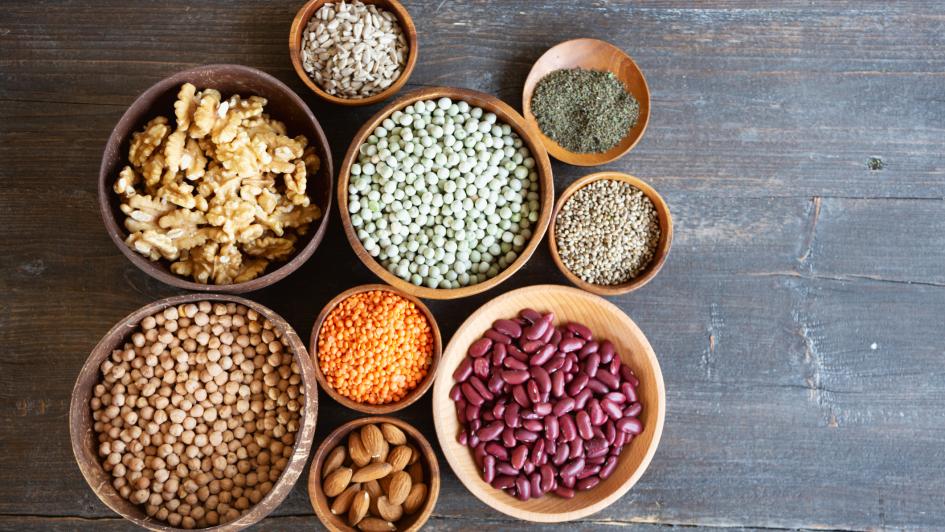Beans: Good for your Body, your Wallet, and the Earth!

Published
If you're dedicated to supporting the environment, your budget, and your health, including beans in your diet can make a big difference.
Often when people think of how to help the planet and their health, they turn to their diet. At the Bastyr, we're big fans of beans. They're environmentally friendly, affordable, and can help prevent chronic disease. We recommend filling a quarter of your plate with beans such as kidney, garbanzo, cannellini, pinto, and black beans 5-7 times a week.1 Whether you follow a plant-based or omnivorous diet, eating beans regularly will benefit the planet, your wallet, and your health.
Environmental advantages of beans
Choosing plant-based proteins such as beans, tofu and tempeh over animal-based proteins, like red meat, benefits the environment.2 Growing plant-based proteins creates fewer greenhouse gases.2 Greenhouse gases trap heat in the atmosphere and lead to global warming.3 Of the plant-based proteins, beans are an especially great choice for helping the environment. Analyses by scientists show that switching out beef for beans would significantly reduce greenhouse gases.4 Swapping beef for beans would especially lower methane and carbon dioxide emissions,4 two of the gases that have some of the worst impact on the atmosphere.3
Switching from beef to beans would also free up 42% of cropland in the United States. This would be about 1.6 times the size of California.4 Freeing up cropland leaves more space for natural ecosystems with native plants and animals, to thrive. With one simple swap of meat for beans at the dinner table, you can help preserve our planet for future generations.
Shopping for beans won't break the bank!
Beans are a budget-friendly choice. While people tend to think of plant-based eating as expensive, it isn't always the case. Both canned and dried beans are cheaper than processed, plant-based, imitation meat products and most animal meat products, like beef! Dried beans will take more time to prepare, but they are significantly cheaper per serving compared to canned beans. Canned and dried beans are shelf stable, which helps cut down on the cost of food waste. Swap in beans to help keep your food costs down.
Your body will thank you for choosing beans
Beans support your personal health. They are heart healthy and help to achieve and maintain a healthy weight. Researchers found that swapping out red meat for plant-based proteins, including beans, lowered the risk of heart disease.5 In observational studies, eating more beans was associated with healthier cholesterol levels.5 As for the healthy weight, it's due to the protein and fiber in beans. Protein and fiber help create the feeling of fullness. When we feel full from beans and other protein and fiber rich foods, we tend to eat less food. This can help with weight loss and healthy weight maintenance. On average, people who eat more beans have lower weight and smaller waist size.5 Beans can be a helpful part of your health journey, especially if you want to prevent heart disease and reach and maintain a healthy weight.
Now you know how eating more beans will help the planet, fit into a budget, and benefit your health. Try adding beans to curries, soups, burritos, sandwiches, and more for a filling and tasty meal.
At the Bastyr University clinics, we recognize that what we eat matters for both personal and planetary health. Guidance from a nutrition expert can help you learn to incorporate healthy foods such as beans into your routine. You can call the Bastyr Center for Natural Health in Seattle at (206) 834-4100 or Bastyr University Clinic in San Diego at (858) 246-9730 to make an appointment with our nutrition team. We'll help you find a way to meet your health and environmental goals, while considering your preferences and lifestyle.
Adele Secrest is a dietetic intern at Bastyr. She’s interested in plant-based diets, food justice, and inclusive approaches to nutrition. In her free time, she enjoys yoga, meditation, and long walks in the woods.
References:
- Nutrition Team. Bastyr Center for Natural Health. "Whole Foods Core Eating Plan." December 2014.
- Musicus AA, Wang DD, Janiszewski M, Eshel G, Blondin SA, Willett W, Stampfer MJ. Health and environmental impacts of plant-rich dietary patterns: a US prospective cohort study. Lancet Planet Health. 2022 Nov;6(11):e892-e900. doi: 10.1016/S2542-5196(22)00243-1. PMID: 36370727; PMCID: PMC9674022.
- US Environmental Protection Agency. Overview of Greenhouse Gases. EPA. https://www.epa.gov/ghgemissions/overview-greenhouse-gases. Published May 16, 2022. Accessed March 31, 2023.
- Harwatt, H., Sabaté, J., Eshel, G. et al. Substituting beans for beef as a contribution toward US climate change targets. Climatic Change 143, 261–270 (2017). https://doi.org/10.1007/s10584-017-1969-1
- Harvard T.H. Chan School of Public Health. Legumes and Pulses. The Nutrition Source. Published October 28, 2019. https://www.hsph.harvard.edu/nutritionsource/legumes-pulses/

